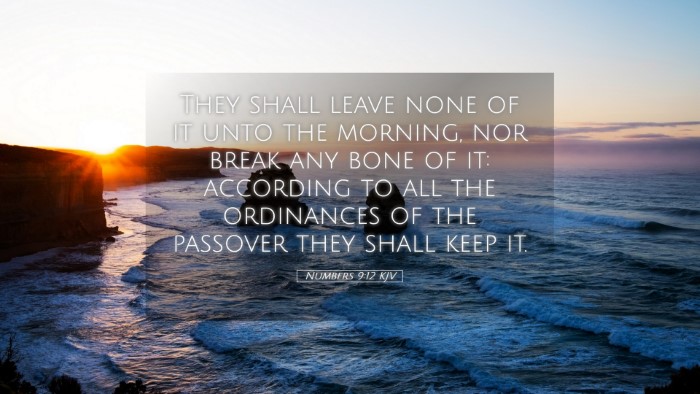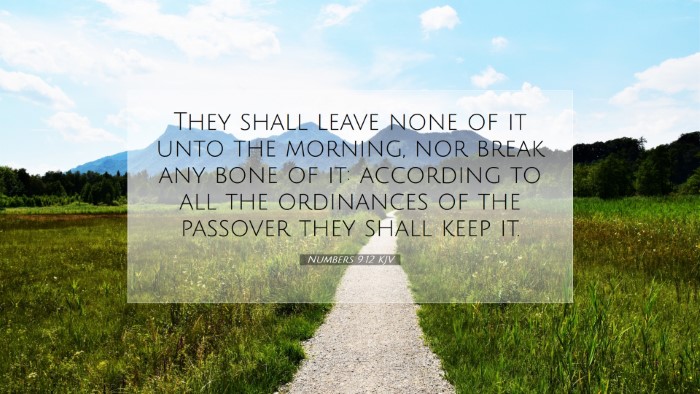Commentary on Numbers 9:12
Numbers 9:12 states, "They shall leave none of it unto the morning, nor break any bone of it: according to all the ordinances of the passover they shall keep it." This verse underscores the significance of adherence to the divine instructions regarding the Passover Lamb.
Overview of the Passover Context
The Passover represents a foundational event in the history of Israel, marking their deliverance from slavery in Egypt. As they prepared to enter the Promised Land, God's commands reiterated the importance of obedience and remembrance. The regulations surrounding the Passover Feast reflect not only the historical acts of God but also provide a framework for understanding covenant faithfulness.
Insights from Matthew Henry
Matthew Henry emphasizes the precision required in the observance of the Passover. He notes:
- Holiness of the Sacrifice: The lamb's bones were not to be broken, prefiguring Christ, who is identified as the ultimate Passover Lamb whose body was not broken during the crucifixion.
- Divine Commandments: The adherence to God’s ordinances in consuming the Passover is a testament to faith. Each detail woven into the ordinance serves to remind the Israelites of their past and God’s promises.
Insights from Albert Barnes
Albert Barnes provides a theological reflection, noting:
- Symbolism of the Sacrifice: The regulations regarding the lamb, including not breaking its bones, serve as a foreshadowing of Christ's sacrifice, fulfilling the Passover requirements perfectly.
- Unity and Completeness: Barnes discusses the necessity of consuming the entire lamb, which illustrates the completeness of Christ's work, ensuring none of His redemptive power is lost or left unclaimed in the believer’s life.
Insights from Adam Clarke
Adam Clarke elaborates on the practical implications of this command:
- Preparation for Obedience: Clarke underscores the importance of preparation and readiness to follow God's directions faithfully. The Israelites' careful observance demonstrates their trust in God's provision and timing.
- Corporate Responsibility: The Passover ceremonies required familial participation, emphasizing community and shared faith experiences, illustrating how God's deliverance can encompass households as a repository of grace.
Theological Implications
The instructions in Numbers 9:12 extend beyond a historical observance; they underscore deeper theological principles:
- Importance of Obedience: The meticulous nature of these commands reflects God's desire for His people to understand the significance of obedience in their covenant relationship.
- Foreshadowing of Christ: This passage serves as a prophetic reference to Jesus, connecting Old Testament rituals with New Testament fulfillment. Each detail encapsulates aspects of salvation and redemption.
Conclusion
In conclusion, Numbers 9:12 is replete with rich theological insights that enrich our understanding of the Passover. The instructions serve to remind believers today of God's faithfulness, the importance of obedience, and the centrality of Christ in God’s salvific plan. As pastors, students, and theologians reflect on this scripture, they find a call to both remember and live out the profound truths encapsulated within this ancient ordinance.


